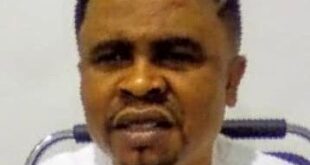By Godwin Chukwumaechi, Port Harcourt
The National Association of Seadogs (NAS), Pyrates Confraternity, has decried federal and state governments’ sustained low budget for the education sector, blaming it for the decreasing level of education in the country.
This was as the Seadogs donated training materials and books to primary schools in Degema Local Government Area to commemorate this year’s International Day of Education.
The confraternity urged the federal and state governments to renew their commitment to providing quality education for all Nigerians as a matter of right, and as a strategy of ensuring that every child reaches their full potential.
The Olympus Marino Deck, Rivers State Chapter 1 of the Seadogs, Mr Iche Wordu, capoon, speaking at the event, advised the government to invest in infrastructure, teacher training, and provision of educational materials, as well as addressing cultural attitudes and systemic barriers to education.
He stressed that through cross-sectoral synergies, increased policy emphasis, Nigeria could build a future in which every Nigerian has access to the opportunities that education provides.
Wordu noted that government has sustained a low budget for the sector amidst strikes by teachers and other workers, inadequate and dilapidated infrastructures, insufficient research, shortage of skilled workforce, insecurity, brain drain, among other challenges bedeviling the sector.
According to the NAS leader in Port Harcourt, the dearth of education at the lower level continues despite the fact that the first nine years of education in Nigeria is compulsory and free by Nigeria’s UBE Act.
He listed the several policy inefficiencies responsible for Nigeria’s poor education output to include; access to education, inadequate infrastructure, low quality of education, funding shortages and limited opportunities for girls.
He regretted the report that Nigeria has the lowest education budget in six years, with the report coming months after the president’s promise to double education funding.
Wordu said; “In July 2021, President Buhari had promised at a Global Education Summit in London to beat the global benchmark of twenty percent (20%) and raise his government’s budget for education to fifty percent (50%) in 2022 and 2023, and to one hundred percent (100%) by 2025.
“However, in less than three months after making the promise, the president submitted the proposal budget for 2022 to the National Assembly on October 7, 2021. Regarding the national budget percentage, the proposed budget for education (in 2022) is the lowest since President Buhari assumed office in 2015, thereby completely reneging on his promise, which he made at a global summit earlier. The budget shows that the government will spend more of the education budget on salaries and running of offices, much more than it will spend on infrastructure.
“Of the proposed budget of N16.39 trillion, the education sector gets N705.27 billion. The recurrent budget, comprising funds for salaries, training of employees and running of offices, will come to N593.47 billion and funds for infrastructural development in the sector, known as capital budget, as proposed, will take a meager N111.80 billion. The percentage allocation to the sector therefore stood at (4.3%) of the national budget. In 2021, the percentage allocation to the sector was (5.68%) of the national budget. The approved national budget for the year was N13.58 trillion,” he said.
Wordu added that another major obstacle to education in Nigeria is lack of access, adding that rural communities lack adequate schools, while many schools in urban areas are overcrowded and under-resourced. As a result, many children, particularly those from marginalized communities, do not have access to education.
“Many schools in Nigeria lack basic facilities such as electricity, clean water, and toilets, making it difficult for children to learn effectively. In addition, classrooms are often overcrowded and poorly equipped, with limited access to instructional materials. These conditions create an environment that is not conducive to learning, and can have a negative impact on the quality of education.
“The quality of education in Nigeria is often low, with many teachers undertrained and lacking the necessary resources to provide effective instruction. This is compounded by the shortage of educational materials, including textbooks and instructional resources, as well as limited opportunities for professional development for teachers.
“The education sector in Nigeria is chronically underfunded, leading to inadequate resources for schools and teachers. The lack of funding affects not only the quality of education, but also access, as schools are unable to invest in new facilities or hire additional staff.
“Despite progress in recent years, girls in Nigeria still face significant barriers to education, including cultural attitudes and poverty. Many families do not see the value in educating girls, and prefer to invest in the education of boys. In addition, many girls face physical and cultural barriers to education, such as child marriage, early pregnancy, and gender-based violence”.
Wordu however, expressed believe that the listed example and call on the government will inspire policy makers at the state and national level to prioritize education for the overall benefit of Nigeria citizens.
 PH Mundial – Port Harcourt Online Newspaper News Across The Region
PH Mundial – Port Harcourt Online Newspaper News Across The Region



